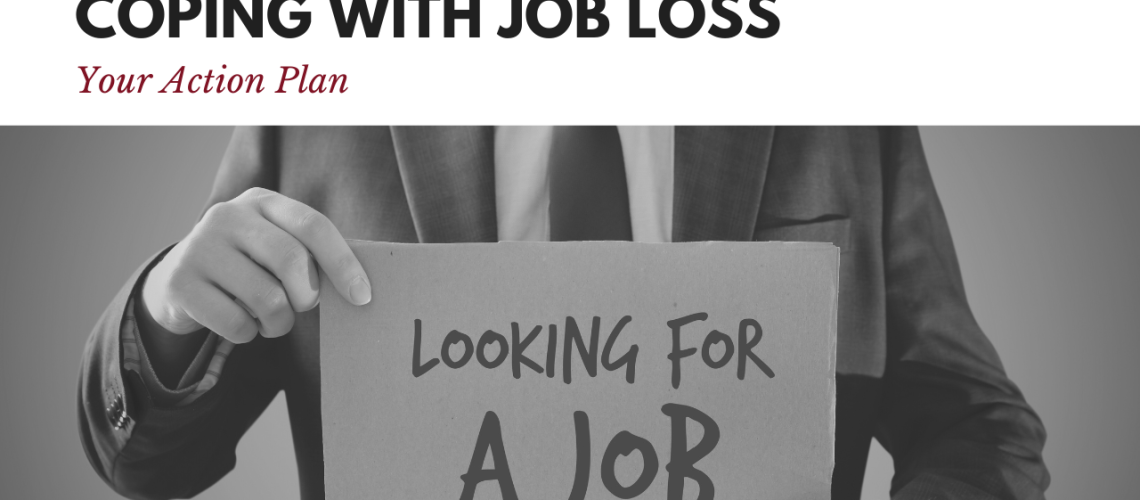By Dr. Salam Slim Saad
Losing your job can be a shock to the system. One day, you’re clocking in and out, working towards your goals, and the next…you find yourself fired. It’s a tough pill to swallow, but here’s the thing: it happens to almost everyone at some point in their career. So, instead of wallowing in self-pity or staying on what went wrong, let’s focus on what you should do if you find yourself facing this unexpected difficulty. In this blog post, we’ll explore practical steps to help you navigate through the aftermath of getting fired with grace and resilience. From understanding the reasons behind your termination to taking care of financial matters and revamping your job search strategies – we’ve got you covered! So, take a deep breath, put that chin up high, and let’s start with our tips.

- Understanding the Reasons for Getting Fired: Setbacks are a part of everyone’s career journey, and what truly matters is how you bounce back from them. Maintaining a positive attitude, staying focused, and continually moving forward will lead you toward new opportunities and personal growth. Losing your job can be an emotionally challenging experience, but it’s crucial to gain clarity by comprehending the reasons behind your dismissal. This reflection not only helps you process the situation but also equips you to avoid similar pitfalls in the future. Here are some insights into understanding these reasons:
- Performance-Related Issues: Take an honest look at your work habits and assess if you met the job’s expectations or deadlines. Did you struggle to meet certain requirements? Identifying areas for improvement in your work performance is a constructive step.
- Misconduct Or Policy Violations: Sometimes, getting fired stems from violating company policies, which can include actions such as dishonesty, harassment, or excessive absenteeism without valid reasons. Acknowledging your mistakes is a vital part of personal and professional growth.
- Organizational Changes: Understand that not all job terminations are a result of personal actions. Companies may undergo structural changes, downsizing, or even closure due to economic factors beyond individual control. It’s essential to recognize when your dismissal is linked to broader corporate decisions.
Coping with the Emotional Impact of Job Loss
Losing your job can have a profound emotional impact, stirring up a mix of feelings like sadness, anger, fear, and uncertainty. These emotions are entirely normal reactions to a major life change like job termination. To effectively navigate this emotional rollercoaster, here are some strategies to consider:

- Permission to Feel: Understand that it’s okay to experience these emotions. Acknowledge them without judgment, as they are a natural part of the healing process.
- Healthy Outlets: Find constructive ways to express your emotions. Talk to a trusted friend or family member about what you’re going through, keeping the lines of communication open. Journaling your thoughts and feelings can also provide a helpful release. Engage in activities that bring you joy and relaxation, like pursuing a hobby or spending time in nature.
- Prioritize Self-Care: Take care of your physical and mental well-being. Ensure you maintain a balanced diet, incorporate regular exercise into your routine, and establish a consistent sleep schedule. Pay attention to your mental health by practicing mindfulness techniques such as deep breathing exercises or meditation.
- Seek Support: Although it might be tempting to withdraw, connecting with others is vital. Lean on your social network for encouragement and advice. Don’t hesitate to consider professional help through therapy or career counseling services if needed.
- Avoid Self-Blame: Remember that losing your job does not define your worth as a person. Avoid internalizing negative beliefs about yourself stemming from this experience. Instead, view it as an opportunity for personal growth and development.
Taking Care of Financial Matters After Job Loss
There are proactive steps you can take to regain control over your financial situation and alleviate some of the stress that accompanies job loss. Here’s a comprehensive guide to help you navigate this challenging period:

- Assess Your Expenses and Create a Budget: Begin by evaluating your current expenses and creating a budget that aligns with your new circumstances. Identify areas where you can cut back on non-essential spending and prioritize essential bills like rent or mortgage payments, utilities, and healthcare.
- Explore Your Severance Package and Benefits: Check if your previous employer offers a severance package or benefits, such as unused vacation pay or continued health insurance coverage. Understanding what you’re entitled to will empower you to make informed decisions about managing your finances during this transitional phase.
- Consider Unemployment Benefits: If applicable, look into filing for unemployment benefits. These temporary funds can provide some financial relief while you actively search for new job opportunities.
- Review Existing Savings and Emergency Funds: Take a look at your existing savings or emergency funds that may be accessible to cover immediate expenses. If necessary, explore options such as personal loans or credit card balance transfers with lower interest rates to manage outstanding debts.
- Explore Part-Time Work or Freelancing: Investigate the possibility of part-time work or freelancing gigs that can supplement your income while you search for a full-time position. This additional income can help bridge the financial gap.
- Seek Guidance from a Financial Advisor: It’s essential to consult with a financial advisor who specializes in job loss situations. They can provide expert guidance on restructuring your investments and creating a tailored action plan to meet your specific financial goals and needs.
Updating Your Resume and Job Search Strategies
When you face the challenge of job termination, one of the initial steps to take is updating your resume. It’s vital to present your skills, experience, and accomplishments in a clear and concise manner. Here are some practical tips to help you with this crucial task:

- Reflect on Your Achievements: Begin by revisiting your work history and pinpointing key achievements that showcase your value as an employee. For instance, if you boosted sales by 30% in a previous role, make sure it’s highlighted.
- Emphasize Awards and Recognition: If you received any awards or recognition during your employment, be sure to include them. This could be the Employee of the Month award or a certificate of excellence.
- Tailor Your Resume: Customize your resume for each specific job application. Highlight the skills and experiences most relevant to the position you’re pursuing.
- Aside from refreshing your resume, refining your job search strategies is equally important. Consider the following steps to maximize your job search effectiveness:
- Define Your Career Goals: Take time to reflect on the type of role you aspire to secure next. Consider factors such as industry, company culture, and opportunities for career growth.
- Utilize Online Platforms: Extend your job search beyond traditional job boards. Leverage online platforms like LinkedIn, where you can connect with potential employers directly. For instance, join relevant LinkedIn groups and follow companies of interest.
- Create a Professional LinkedIn Profile: Develop a compelling LinkedIn profile that showcases your skills, experience, and endorsements. Include a professional photo and a well-crafted summary.
- Consider Blogging: If appropriate, start a blog related to your field of expertise. Sharing your insights and knowledge can demonstrate your passion and expertise to potential employers.
- Network Actively: Reach out to contacts within your industry for informational interviews or referrals. Personal connections can often open doors to hidden job opportunities.
Remember, finding a new job may require some time, so maintaining a proactive and positive attitude throughout the process is essential. Stay focused on discovering opportunities that align with both your short-term goals and long-term aspirations.
Navigating Job Loss: Networking and Seeking Support
In the aftermath of a job termination, networking and seeking support are pivotal steps to not only regain your footing but also to propel your career forward. Building a strong network of professional contacts serves as a gateway to fresh opportunities, giving helpful advice and thoughts along the way. Here are some practical tips to assist you in this process:

- Use Your Existing Network: Reach out to your established contacts, such as former colleagues, mentors, or friends within your industry. Inform them about your current situation and inquire if they might be aware of any potential job openings or connections that could aid you in your job search.
- Expand Your Horizons: Don’t confine your efforts solely to your existing network. Consider joining professional networking groups or attending industry-related events. These endeavors can introduce you to new, potentially influential connections who may have leads or recommendations that align with your career goals.
- Building Up Matters: Networking isn’t merely about asking for favors. It involves building mutually beneficial relationships by offering your own support and expertise whenever possible. Remember that a two-way street fosters trust and reliability in your professional network.
- Explore Local Career Services: Investigate local career counseling services that can provide one-on-one guidance tailored to your specific situation. They can offer you strategies for resume improvement, interview preparation, and navigating the job market effectively.
- Engage in Online Communities: In today’s digital age, there are numerous online communities and forums where individuals facing job loss share their experiences and offer advice. Engaging in these virtual spaces can be an excellent way to gain insights from those who understand the unique challenges you’re encountering.
- Mutual Empowerment: Keep in mind that networking is a dynamic and ongoing process, even after securing a new job. Cultivating relationships with professionals in your field not only aids your immediate situation but also contributes to your long-term career growth. Stay proactive, continuously expand your network, and never underestimate the potential of meaningful connections when navigating the ebb and flow of your professional journey.
Moving Forward and Learning From the Experience
Getting terminated from your job can certainly be an overwhelming and discouraging experience, but it’s essential to recognize that such setbacks can serve as incentives for personal and professional development. To help you navigate this challenging phase, we’ve outlined a series of practical steps that you can take:
- Reflect on the Reasons: Reflect on the circumstances that led to your termination. Identify areas where you can improve to avoid similar situations in the future. For example, if you were let go due to a lack of specific skills, consider pursuing additional training or certifications to enhance your expertise.

- Emotional Resilience: Maintaining emotional resilience is crucial during this period. Prioritize self-care activities such as regular exercise, meditation, or spending quality time with friends and family. Surround yourself with positive influences who can offer guidance and support as you navigate through this transition.
- Financial Stability: Evaluate your financial situation meticulously. Determine how long you can sustain yourself without a steady income and create a realistic budget to manage your expenses. Explore options like unemployment benefits or freelancing to bridge any financial gaps while you search for a new job.
- Update Your Resume: Take the time to update your resume, tailoring it to each job application. Highlight transferable skills gained from your previous positions and address any employment gaps honestly but positively during interviews.
- Leverage Networking: Networking is a critical component of finding new job opportunities. Reach out to colleagues, friends, and family members who might be able to connect you with potential employers or mentors. Joining professional organizations related to your industry can also be highly beneficial in expanding your network and accessing valuable advice.
- Seek Support: Lastly, seek support from individuals who understand the challenges you’re facing. Consider joining online communities or attending local career workshops where you can share your experiences with others who are going through similar situations. These interactions not only provide mutual encouragement but can also lead to the discovery of alternative career paths that you may not have considered before.
In closing, dealing with losing a job is very important because it can happen to many of us in our careers. It takes flexibility and strength to bounce back from this tough situation. Remember, getting fired doesn’t say anything about your worth or what you can achieve. Instead, think of it as a chance to grow both personally and professionally if you approach it with the right mindset and determination.
Job loss is just one part of your work journey, and it doesn’t decide your value or potential. It’s an opportunity to grow, change, and discover new strengths in yourself.
I encourage you to take action. Think about the helpful tips we’ve talked about and make a plan that fits your situation. Whether you’re dealing with job loss now or not, remember that by accepting change and staying strong, you’re not just surviving but thriving on your path to a brighter professional future.



